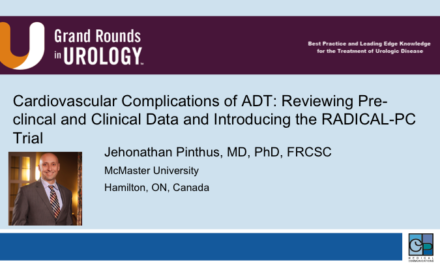Peter J. Rossi, MD, presented “The Role of Molecular Imaging to Improve Cancer Control Post-Prostatectomy” for the Grand Rounds in Urology audience in June 2021.
How to cite: Rossi, Peter J. “The Role of Molecular Imaging to Improve Cancer Control Post-Prostatectomy” June 2021. Accessed Nov 2024. https://dev.grandroundsinurology.com/role-of-molecular-imaging-to-improve-cancer-control-post-prostatectomy/
The Role of Molecular Imaging to Improve Cancer Control Post-Prostatectomy – Summary:
Peter J. Rossi, MD, a board-certified radiation oncologist affiliated with Calaway Young Cancer Center at Valley View Hospital in Glenwood Springs, Colorado, considers the evidence for using molecular imaging to improve prostate cancer control post-prostatectomy, focusing on the results of the EMPIRE-1 study comparing 18F-fluciclovine-PET/CT imaging versus conventional imaging alone to guide post-prostatectomy salvage radiotherapy for prostate cancer. Dr. Rossi explains that while doctors may offer postoperative radiotherapy to patients experiencing a PSA rise or biochemical failure, the decision to do so can be complex and failure rates are high. He notes that improving adjuvant therapy is therefore imperative, and investigators have looked to molecular imaging as the means to do so. Dr. Rossi then describes the aims and methods of the EMPIRE-1 trial, noting that the investigators sought to expand the role of 18F-fluciclovine-PET/CT imaging beyond diagnostics and into cancer control by studying how radiotherapy decisions and planning changed based on molecular scans as compared to standard imaging. The results showed that radiotherapy plans were changed in 35.4% of patients based on PET uptake, and that using PET imaging resulted in a significantly improved and significantly more durable failure-free survival rate compared to using standard imaging alone, suggesting that PET is a viable tool for improving adjuvant radiotherapy. Dr. Rossi concludes by looking at future directions for molecular imaging and adjuvant care, highlighting a new study comparing 18F-fluciclovine-PET/CT to PSMA.
ABOUT THE AUTHOR
Dr. Rossi is a board-certified radiation oncologist affiliated with Calaway Young Cancer Center at Valley View Hospital in Glenwood Springs, Colorado. He received his medical degree from Wayne State University School of Medicine in Detroit, Michigan, and then went on to complete his internship and residency at the Naval Medical Center in San Diego, California, and Wake Forest University in Winston-Salem, North Carolina, respectively. He then held the positions of Associate Professor in the Department of Radiation Oncology and Urology at Emory University School of Medicine, Medical Director of the Department of Radiation Oncology Winship Cancer Institute at Emory Saint Joseph in Atlanta, and James C. Kennedy Chair in Prostate Cancer for several years before relocating to Colorado. Dr. Rossi has published widely on subjects like quality of life, brachytherapy, advanced techniques and technologies in the treatment of prostate cancer and other cancers. He has over 20 years of clinical experience and participates with a multidisciplinary team on a daily basis to provide the best possible care to cancer patients.





